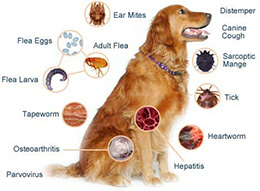Infectious Dog Diseases

Dogs are susceptible to a number of viral diseases that are transmitted from animal to animal and spread with devastating speed. Nearly all can be prevented with vaccination programs. Though many people know them only as the diseases that their dogs need regular shots against, they remain a very real threat in most parts of the world. No owner can afford to be complacent about these diseases. The first vaccinations should be given at between 6 and 8 weeks of age. Boosters will be required, and all dogs should have annual shots thereafter for life.
Distemper is a frequently fatal virus disease that usually affects puppies up to a year old. It is spread by droplets released into the air when the dog coughs or sneezes, and is highly contagious. A cough develops, and there is a discharge from the eyes and nose. Pneumonia, vomiting, and diarrhea usually follow. The infection sometimes responds to antibiotics, but affected dogs often develop fits, paralysis, or chorea (a spasmodic twitch) and have to be put to sleep. The pads of the feet often become thickened and hard, hence the disease's alternative name of hard pad.
Infectious Canine Hepatitis (ICH) is caused by a virus that attacks the liver. In severe forms of the disease, the dog goes off its food completely, becomes very depressed, and collapses. Death is almost inevitable and can occur very suddenly. ICH is transmitted in urine and can be picked up by a dog sniffing at a fencepost or other spot on which an infected dog has urinated.
Leptospirosis affect dogs in two forms: L. canicola, which causes acute kidney disease, and L. icterohaemorrhagiae (Weil's disease), which affects the liver. Both are able to cross between species, including humans. Dogs sometimes pick up Weil's disease from rat's urine when swimming in ponds or rivers.
Canine Parvovirus (contagious enteritis) causes vomiting and diarrhea, often with hemorrhage. It has a sudden onset, and death often follows as a result of dehydration unless prompt action is taken to replace lost fluids intravenously. Infected dogs pass on the virus in their feces. It can remain active in grass or soil for more than a year. Most public areas used by dogs are heavily infected with parvovirus.
Rabies, a virulent viral disease found in animals such as dogs, cats, foxes, bats, and skunks, is spread in saliva when an infected animal bites another. The virus travels up to the brain and affects the central nervous system. Symptoms take between 10 days and 6 months to develop, and death normally follows within 10 days of their appearance. Rabies is endemic in most of the world. Exceptions are Japan, Australia, New Zealand, United Kingdom, Ireland, Scandinavia, Spain, and Portugal. Dogs entering these countries from abroad must show proof of vaccination, and are subject to quarantine laws in some.
Kennel cough is the name given to a group of bacterial and viral infections that cause persistent coughing. Generally nonfatal, they spread rapidly among dogs in crowded conditions. A vaccine against the parainfluenza virus is usually included in annual booster shots. Nose drops to prevent bordetella should be given 2-3 weeks before a dog goes into a kennel. Infectious Enteritis is caused by any of a number of bacterial and viral infections that produce severe diarrhea and vomiting. There are no effective vaccines. The most significant infections are
Campylobacter and salmonella, and both can be passed to humans. If diarrhea is persistent, the vet will take fecal and blood samples to establish the cause of the infection, and prescribe intravenous fluids and antibiotics as appropriate.
Q&A
My dog, Paddy, is 5 now and very robust. Do I really need to have him vaccinated every year? After all, I don't have regular vaccinations myself. Isn't this just a way for vets and drug companies to make money?
Scientific evidence points overwhelmingly in favor of annual vaccination. You should take into account that dogs are exposed to a lot more disease than humans. They sniff at everything, with their noses and mouths only inches off the ground. Many viruses and bacteria are passed in urine and feces, and are concentrated in all the places that dogs investigate most actively. Prevention really is better than cure.
My friend's Labrador puppy died from distemper only about four weeks ago. She is heartbroken and wants me to bring my own Labrador, Glen, to visit. He is 2 years old and has been regularly vaccinated. Is it safe for me to do so?
Perfectly, even if Glen was not protected by his vaccinations. Distemper is spread by direct contact between dogs. The virus cannot survive for long outside the affected dog, so all risk of infection will have disappeared by now.
Six months ago Lucy, my Fox Terrier, spent a few days in a kennel. I had her protected against kennel cough before she went. I am thinking of taking Lucy to a country show next weekend, when there will be lots of other dogs around. Will her kennel cough protection still hold good?
No, it wouldn't be safe to rely on it. The nose drops against bordetella normally give up to 6-9 month's protection, so if Lucy is to enter a high-risk area toward the end of this period, you would be well advised to give her new protection.




Leave a Reply